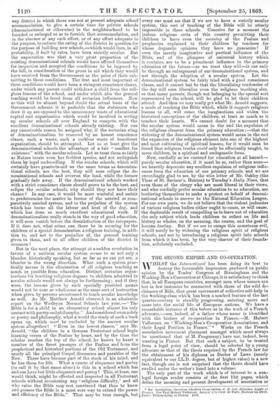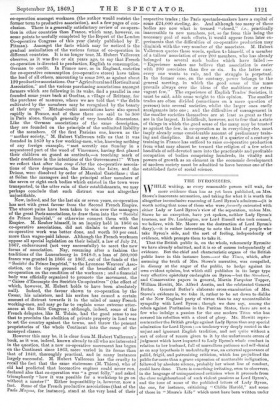THE SECOND EMPIRE AND CO-OPERATION.
WHILST the International has been doing its best to destroy the favourable impression produced on public opinion by the Trades' Congress of Birmingham and the Working-Men's Convention at Chicago, it is satisfactory to think that, in all European countries, amongst men whose names can but in few instances be connected with those of the wild de- claimers of Bale, that great movement of collective self-help in the tvorking-class which has been a marked feature of the last quarter-century is steadily progressing, entering more and more into the social life of European nations. We have a remarkable instance of this before us in the work of a French advocate,—son, indeed, of a father whose name is identified with the history of co-operation in France,—M. Hubert Valleroux, on "Working-Men's Co-operative Associations, and their Legal Position in France."* Works on the French association movement (foremost amongst which must always be mentioned that of M. Feugueray) have not, indeed, been wanting in France. But that such a subject, to be treated from a legal point of view, should be selected by a young advocate as that of the thesis required by the French law for the obtainment of his diploma as Doctor of Laws (nearly equivalent to our LL.D. degree, but of higher value) is a new fact, though one is not surprised that the thesis should have swelled under the writer's hand into a volume.
The only part of the work which is of interest to a non- legal foreign reader consists of the first 132 pages, which define the meaning and present development of association or
* Des Associations Ouctderes (Soda& Co-op(ratives, et de leur Situation Legale en France.) Par Paul Hubert Valleroux, Avoelt is la Cour de Paris, Doeteur en Droll. Paris : Piebon-Lamy et Dewez. 1865. co-operation amongst workmen (the author would restrict the former term to productive association), and a few pages of con- clusion. There is a generally satisfactory review of co-opera- tion in other countries than France, which may, however, on some points be usefully completed by the Report of the London Co-operative Congress of this year (lately published by F. Pitman). Amongst the facts which may be noticed is the gradual assimilation of the various forms of co-operation in different countries. It is no longer true, M. Hubert Valleroux observes, as it was five or six years ago, to say that French co-operation is directed to production, English to consumption, German to credit. In France now, as in England, societies for co-operative consumption (co-operative stores) have taken the lead of all others, amounting to some 300, as against about 120 productive associations. Our "Agricultural and Horticultural Association," and the various purchasing associations amongst farmers which are following in its wake, find a parallel in one founded some years back at Gueltas, a village of Brittany, for the purchase of manures, where we are told that "the fields cultivated by the members may be recognized by the beauty of their crops." Mdtual-credit associations have also spread rapidly in France, and of these there are said to be 300 in Paris alone, though generally of very humble dimensions. Like the German associations of the same description, they are founded on the principle of the unlimited liability of the members. Of the first Parisian one, known as the "mother society," M. Hubert Valleroux• tells us that it was founded in 1859 by a few working-men, who, knowing nothing of any foreign example, "met secretly one Sunday in a sequestered part of the wood of Vincennes, having first placed their children on guard as sentinels,—a touching mark of their confidence in the intentions of the Government!" When we reflect that after the coup d'itat the co-operative associa- tions of three departments, the Rhone, the Isere, and the Drome, were dissolved by order of Marshal Castellane ; that at Sedan the managers and the principal other members of the seven or eight such bodies which existed in the town were transported, to the utter ruin of their establishments, we may perhaps conclude that such distrust was not altogether unjustifiable.
Now, indeed, and for the last six or seven years, co-operation has met with great favour from the Second French Empire. The utmost pains have been taken to win over the managers of the great Paris associations, to draw them into the "Societe du Prince Imperial," or otherwise connect them with the Empire. M. Rouher himself, in an inquiry held in 1866 on co-operative associations, did not disdain to observe that co-operative work was better done, and worth 30 per cent. more than wages-paid labour. Although the French workmen oppose all special legislation on their behalf, a law of July 24, 1867, endeavoured (not very successfully) to meet the new forms of association. Nay, resuming after a fashion the traditions of the Luxembourg in 1848-9, a loan of 300,000 francs was granted in 1866 or 1867, out of the funds of the "Societe du Prince Imperial," to the Lyonnese Weavers' Asso- ciation, on the express ground of the beneficial effect of co-operation on the condition of the workman ; and a financial body was officially organized to promote the movement, the " Caisse d'Escompte des Societes Co-operatives" (the effect of which, however, M. Hubert holds to have been absolutely null). Indeed, the favour shown to co-operation by the Cmar, his ministers, and his scribes has caused a certain amount of distrust towards it in the mind of many French working-men, and may go far to explain some extreme utter- ances at the Bale Congress ; although, indeed, some of the French delegates, like M. Tolain, had the good sense to see that to proclaim the abolition of private property in land was to set the country against the towns, and throw the peasant proprietaries of the whole Continent into the camp of the moneyed classes.
However this may be, it is clear from M. Hubert Valleroux's book, as it was, indeed, known already to all who are interested in the question, that a new co-operative movement has begun on the Continent since 1863, more varied in its forms than that of 1848, thoroughly practical, and in many instances largely successful. M. Hubert Valleroux has the cruelty to recall the fact that the same statesman (M. Thiers), who of old had predicted that locomotive engines could never run, declared also that co-operation was "a great folly," and asked triumphantly "how it was possible for a workshop to go on without a master ?" Either impossibility is, however, now a
fact. Some of the French productive associations (that of the Paris Macons, for instance), stand at the very head of their respective trades ; the Paris spectacle-makers have a capital of some £21,000 sterling, &c. And although too many of these bodies are now what is termed "closed," i.e., practically inaccessible to new members, yet, so far from this being the necessary goal of such efforts, it would appear from later ex- periments that the difficulties of co-operative production may diminish with the very number of the associates. M. Hubert Valleroux quotes these words, spoken .13 himself, of a member of a tailors' association of over 200 members, who has already belonged to several such bodies which have failed Experience makes me believe that association is easier with 200 associates than five or six. In the latter case, every one wants to rule, and the struggle is perpetual. In the former case, on the contrary, power belongs to the general meeting, in which the good sense of the mass prevails always over the ideas of the ambitious or extra- vagant few." The experience of English Trades' Societies, it must be said, adds some weight to this opinion. The smaller trades are often divided (sometimes on a mere question of persons) into several societies, whilst the larger ones easily amalgamate into one ; and the difficulties of management in the smaller societies themselves are at least as great as they are in the largest. It is difficult, however, not to fear that a state of things in which the good sense of the many may be trusted' as against the few, in co-operation as in everything else, must imply already some considerable amount of preliminary train- ing and discipline. But at any rate, if a quarter of a century's training in France has sufficed to raise co-operative production from what may almost be termed the religion of a few select handfuls of self-devoted men into the practicable and profitable occupation of bodies comprising hundreds, its vitality and powers of growth as an element in the economic development of modern society must be admitted to have become one of the established facts of social science.































 Previous page
Previous page